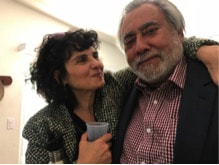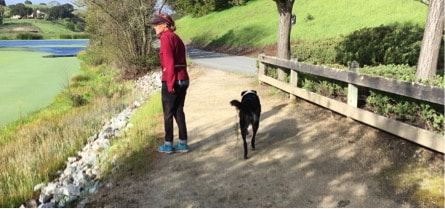|
Left: Doris Bittar with Newton Harrison; Right: Melissa with her beloved dog, Bailey at El Toro pond in Salinas, California "Why not a Pilot?"
Doris Bittar and I (Melissa Smedley) traveled to the Santa Cruz home of Helen and Newton Harrison to celebrate the life/passing of Helen Harrison. During the early nineties, Doris and I intersected at UCSD and each had our experiences, our imprinting from this art making couple. On Sunday morning, we traversed the salad bowl of Salinas Valley all the way to the mouth of the river at the sea edge. After leaving one car near a slough, together we made our way up route 1 toward Santa Cruz. We encounter some traffic molasses, due to the coolness of Santa Cruz, and accidently allow navigation-lady to lead us to a slightly dystopic hilly stucco area. It was noticeably very un-Helen like and too quiet, where people may be trapped in their cul de sacs. Because we are fortunate to have studied with these exemplary forward-thinking humans, Helen and Newton Harrison, they have also listed themselves deliberately in the various locator search engines, because they’ve been running a business. When we arrived at the real place, of course the gathering had oozed out the door and into the street with conversations, squirrely children’s noises and food smells, all a- buzz with thoughtful humans, chairs and such on the street: this was the undead gathering we were imagining. The oldest son out front wearing an apron cooking tri tips on one of those portable crank-up-and-down grills. All ages of folk, woven in and through their lives through many channels and chapters. While Joseph Albers prints hung humbly and dustily on a wall. Newton was dressed in a nice suit, with sandals and black socks made to not ever be shoes, reclining on a chair, one made for that, next to a matching recliner that was not empty, yet it was not exactly her there, yet it was. His handshake was warmed doubly as two large tanned paddles cupped my scrawny arm; a great hospitality was extended though I personally have been a lousy near-neighbor, never visiting ‘til now. When it was time to make a toast, to say a few words, there were considerable twinklings in Newton’s and others eyes. Some great little snippets were uttered. Including the daughter who, after an exciting international trip at age 10 or so, was enamored of the stewardesses and given a set of wings. “I know what I want to be when I grow up” she says to her mom, “a stewardess” …. .. “Why not a pilot?” said Helen. A woman standing in the kitchen with lovely unruly grey hair and artistic glasses sang a song about Soulmates, “Hiye diddle lye diddle eye Lye .. (or something) she sang for us in Yidddish what her rabbi had sung to her over the phone, (which I remembered as “hey diddle diddle”) yes the cat and the fiddle. The song was roughly about how you can’t say good bye to a soulmate, because this one is part of your puzzle, always there because you two made you together. Newton recounted that last week Helen had come directly into his ear speaking – she told him to switch the TV channel, “You know I don’t like “Westerns”. “So, I changed the channel” he said. Another woman sang a song in Croation, acapella, standing there by his bookshelf, she offered a song about being very very sad, so that through singing it, you can let some of the sadness out, so that you can then be more free to carry on.” La LA La la la la she closed her eyes and let it flow and pause and breathe in sad sad song, with the shared intent in her cradle, wearing a simple dress in the afternoon. Where this here story-delivery person broke the water out of her eyeballs was when the caregiver spoke, telling us what a privilege it was to get to know Helen and what a whole new lease on life she had as an independent woman after having been part of the family. “A part of the family”, was a theme here, as persons from many chapters of their lives coalesced in one space. Various academics, authors, neighbors, children, colleagues, former students, curators, etc., etc., had in different ways, been made to feel like part of the family. Former students expressed awe of her work, at the same time as the nurturing, which does not always happen. As we were exiting, I was drawn to a big pure smile saying goodbye and “thank you for coming”: this turned out to be a neighbor who had been coming over twice a week for two years to sing with Helen. “You are my sunshine.. my only sunshine ….” being the last song she sang. My own memory having to do with Helen was that she always carried a big big purse that seemed at times at odds with her prodigious thought orbit. But what did I know? Now, I think the purse was a form of insulation from the institutional concrete grind. I’m very glad to have attended, besides interface with the legacy, this included several interesting conversations with strangers, as well as a re-bonding with classmates Doris Bittar, Stephane Heyl, now Violet Harlo, from “the institution”, as well as conversation with daughter, Joy. Doris adds, "I feel compelled, at the end of Melissa’s lovely recollections, to interject about the big purse. I think Helen wore a big purse, because essentially these maverick artist team were/are a product of their circumstances. Helen had a lot of things in her purse like all middle class moms. There was aspirin, band-aids, the latest book she was reading as she was a voracious reader, a small package of tissues, probably Newton’s medications, a notepad or small sketchbook. She was often in that bag looking with some consternation. The nurturing, we grad students received was in that bag. I was a new student and also a new mom while at UCSD. I was in a disarray over coinciding mom and art duties. I was sometimes quite frustrated and sad because if it. Being a new mom interfered with my art. I stumbled over my new role, and it felt quite awkward. Helen took me aside and pointedly said, “It is better to express anger than be sad. Anger motivates.” I was reluctant to accept this for years, but I never forgot it. Having long vowed not to become one of those kind of tough women, I had to learn to be angry and constructive somehow. I worked on that for fifteen years, being angry, motivated and constructive about all kinds of issues. Finally, in my mid-forties I wore my Bitch medal with honor, and always remember Helen’s words, which decidedly got me out of my hole of sadness."
0 Comments
Leave a Reply. |
AuthorWrite something about yourself. No need to be fancy, just an overview. Archives
January 2019
Categories |


 RSS Feed
RSS Feed